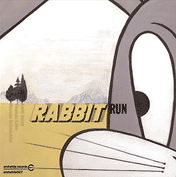|
Heard In
Reviews of artist releases:
cd's, books, magazines, &c.
review by Brian Olewnick
2003-05-25

Jerome Noetinger/Erik M - What a Wonderful World
Keith Rowe/Thomas Lehn/Marcus Schmickler - Rabbit Run (Erstwhile)
Aside from their wonderful musical qualities, this pair of releases from Erstwhile illustrates an increasingly common avenue pursued by artists nominally associated with free improvisation, namely, post-production. While "traditional" free improv has proudly put itself out as an "as is, where is" product, the fewer frills attached the better, younger musicians reared on the technological advances employed by popular music have seen the recording studio (and its various computerized enhancements) as yet another tool, one that may well be used in constructing a new type of music from a real-time performance.
What a Wonderful World (bearing surprisingly little overt resemblance to anything by Louis Armstrong) finds Noetinger and Erik M moving sideways from pure improv into the world of musique concrete, though the latter is there more as a strong flavor rather than its major component. Indeed, the first three tracks aren't much different than what one might have expected from this pairing: a rich and heady assortment of abstract electronic sounds, more clearly limned than cloudy, harsher than they are sweet. Suddenly, on the fourth track, gales of children's laughter invade the space with screams of delight and taunting as though one had just veered into a Luc Ferrari collage. These amusical found sounds percolate up periodically from that point on. What the original improvisation contained has become impossible to discern; presumably it's still there, somewhere underneath, but the substantial amount of post-production has rendered such questions meaningless. There's a great moment during the piece "Dark Sacred Night" where a chanteuse's torch song is consumed and obliterated by a firestorm of static and white noise. When did that musical event occur? Who knows? This disc is presented as a slightly different kind of product, asking hardcore free improv listeners to, perhaps, shed some past prejudices. By linking up to another avant-garde tradition of long standing, Noetinger and Erik M have opened a door to a fascinating avenue of potential exploration.
Rabbit Run was conceived otherwise. The trio (the creators of 2001's Erstwhile title Bart supplemented by AMM guitarist Keith Rowe) created several hours worth of improv with the pre-existing idea that Marcus Schmickler would take the results back to the studio and fashion an altogether different creature from the raw materials. This went through at least three permutations, the music varying wildly from one to another. The final product is a 41-minute slab of sound, cobbled together from who-knows-what portions of the original source and, moreover, divided into 42 tracks with the advice that the listener make generous use of shuffle mode. So, once again, one is presented with an artifact that, in a sense that has historically been crucial to fans of the genre, never existed in the world. Despite the original music having been a pure group effort, the disc is a concoction owing far more to the sensibilities of Schmickler. Whether you want to concern yourself with such matters is, of course, up to the individual (though I strongly suspect that the musicians want you to) and it is perfectly possible to listen to the album as, simply, some seriously powerful music. As might have been expected from experiencing Bart, there is a strong tendency toward explosive, rough noise, drastic fluctuation of dynamics and a general underlying sense of unease. This all makes for an exhilarating ride, scary at one moment, joyous the next, always anticipating the upcoming corner turn. Which musician does what would have been difficult enough to figure out in a straight recording of the event; it's now not only hopeless but utterly beside the point. Though it's complex enough listening as recorded, employing the shuffle mode sends it into an alternate realm, with a virtually infinite amount of possible variations, that the listener may or may not prefer. At times, there's a little too much of a Zornian jump cut aspect for my taste; other times the surprising juxtaposition that results allows the unique perception of a previously unimagined aesthetic facet. I should also mention Rowe's archly humorous cover painting for this disc, an image that itself holds multiple meanings.
However one approaches them, both discs are superb recordings in and of themselves as well as valuable signposts for what is likely to be an increasingly common direction for improvisers to consider.
Comments and Feedback:



More Recent Reviews, Articles, and Interviews @ The Squid's Ear...


|
|
|
|

